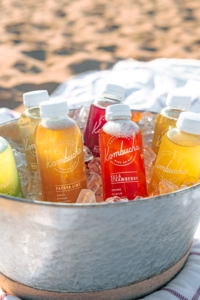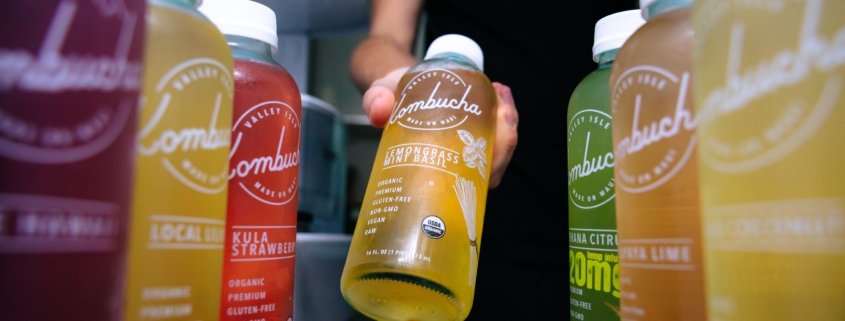Kombucha
Health Benefits:
Kombucha is fascinating, both as a hot trend in the beverage aisle and in the biological sense. It is brewed with a live, expanding bacterial culture. Kombucha originated in Asia and has been around for centuries. Its popularity is only growing with health-minded and food-trend minded people alike.
Kombucha is a fermented tea made by adding a culture of bacteria and yeast to a solution of tea, sugar and sometimes fruit juice and other flavorings. It’s often referred to as “mushroom-tea” because during the brewing process the bacteria and yeast grow into a mass that resembles a mushroom cap.

The drink has a slight effervescence and sweet-tart flavor. It often has small remnants of the culture mix floating in it. This sounds unappealing but is not much different from finding some sediment in your wine or tea. Kombucha is highly acidic, contains sugar, B vitamins and antioxidants, as well as some alcohol that results from the fermentation process. It contains about 30 calories per eight ounces (mainly from the sugar), making it a better calorie pick than most other juices and soft drinks.
Where to Find Kombucha:
You can buy bottled kombucha, both pasteurized and unpasteurized, in various flavors everywhere from health-food stores to supermarkets. The drinks have exploded on the market and come in many flavors: fruity, traditional and even with added greens or veggies!
You can also brew your own by either buying a culture starter (called the “mother”), and fermenting your sweetened tea in a clean jar for 7 to 14 days. As with any other home brewing, it is important that you research the proper technique and do it under highly sanitary conditions.
Kombucha and Gut Health:
Kombucha has been touted as a magic elixir, curing everything from digestion problems to arthritis and cancer. On the other hand, it has also been maligned as a potentially toxic alcoholic beverage. In actuality, moderation is key. The huge health claims are not proven, with no good research on human subjects. Since kombucha contains probiotics (good gut bacteria), there is likely to be some benefit to gut health and immunity.
The downside is that kombucha’s probiotics do not survive the pasteurization process. Drinking it unpasteurized, if it was not produced in sanitary conditions, may pose as a food safety threat, especially for those who are pregnant or have compromised immune systems. Some of the reported side effects of excessive and/or contaminated kombucha consumption include stomach upset, acidosis, allergic reactions to the molds that can develop during fermentation, and toxicity from heavy metals from home-brewing in ceramic pots. So clearly, you will want to make sure your brew is from a safe source.
Alcohol in Kombucha:
Regarding alcohol content, the government requires that a beverage must have less than 0.5 percent alcohol (a trace amount) if it is to be sold as a nonalcoholic drink. Bottled kombucha must comply with that standard or risk being pulled off the shelf. Home brews, however, may vary in alcohol content, so you’ll want to keep your eye on that as well.
So while it is not be a miracle elixir, kombucha may have some probiotic benefit, plus it is relatively low in calories and sugar. As with anything else, use good common sense, and if unsure of safety, make sure you purchase only the pasteurized kind. If pregnant, young, sick, or immunocompromised, drink only pasteurized kombucha.




